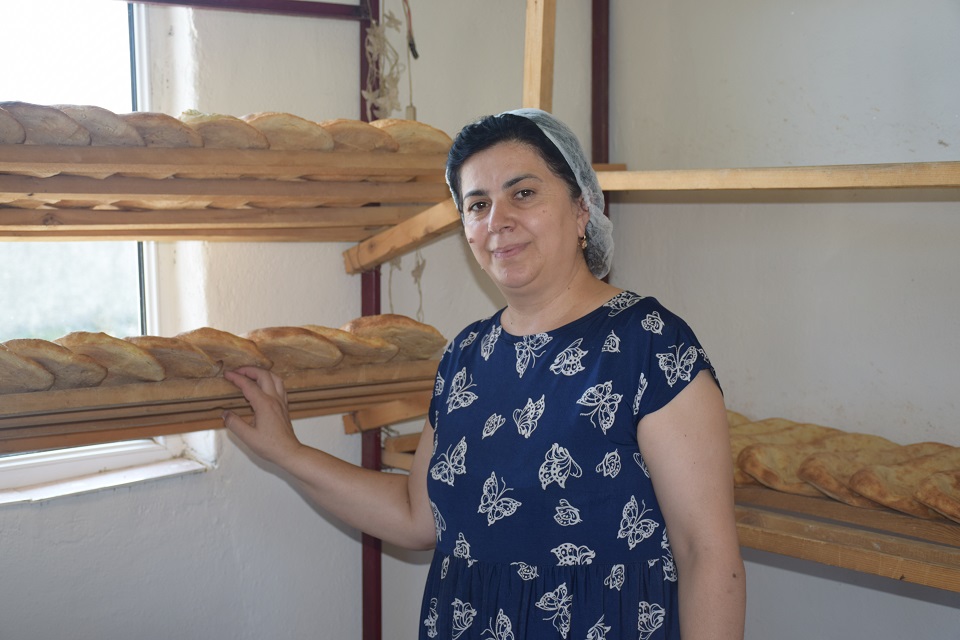A new life with fresh opportunities for the women of Karajala
UN Women and the Kakheti Regional Development Foundation have been working on the social mobilization and economic empowerment of women living in rural areas in the Kakheti region of eastern Georgia since 2019. One such place is Karajala, a village inhabited by ethnic Azerbaijanis in which the “Women’s Economic Empowerment in the South Caucasus” project has created completely new opportunities, not only for women but for the community as a whole.
Date:

“Now we have more freedom, although there is still a lot of work to do,” noted Amalia Kurbanova, a 48-year-old entrepreneur from Karajala.
Amalia Kurbanova, 48, became interested in the gatherings of her fellow village women two years ago. When she first attended such meetings, she had no work experience at all. Having married early, she was initially busy raising her children and doing the daily work of a housewife. “I wanted novelty and diversity,” Amalia recalls. “So, I thought, why not do something else as well?”
At these gatherings, she discovered that she really could do “something else”, when at the age of 46 she heard that UN Women and the Kakheti Regional Development Foundation were implementing a project for women’s economic empowerment in her village. One part of the project was entrepreneurship training, alongside further funding. During the course, Amalia came up with her own business idea; she then wrote a successful grant application with the knowledge she had gained during the training. Eventually, she opened a bakery in her garden and started selling freshly baked bread to her fellow villagers.
“I live just by the side of the road, so the location was favourable for me,” Amalia explains. “It’s true that I didn’t know how to bake bread, but I learned how to do it together with my son, and my family stood by me too. When I get up at seven o’clock in the morning, as soon as I drink a cup of coffee, I open the bakery, I knead the dough, and my son starts baking the bread. The bakery is open until nine o’clock in the evening. And we are already making a daily income.”
She also notes that the result of the project was not merely centred around business activities. It has also had a great influence on the socialization and personal development of local women. “We were happy that we, women from different villages, had an opportunity to meet one another,” emphasizes Amalia. “We were learning and developing in the training. Now we have more freedom, although there is still a lot of work to do.” Alongside the development of her business, Amalia plans to support this new-found freedom as much as she can.
“It’s never too late, no matter your age. The main thing is to have a strong will,” says Kheiran Rasulqizi, a 63-year-old farmer from the village of Karajala.
Kheiran Rasulqizi, 63, had been the only tailor in Karajala for a long time. This single mother raised her two children with income she earned from her sewing. However, alongside tailoring, she later started another job: vegetable farming.
New opportunities emerged in Kheiran’s life in 2019. After joining the project implemented by UN Women and the Kakheti Regional Development Foundation, she, the oldest participant, took sewing and weaving courses, and then improved her Georgian language skills and even started helping her community members with translations. Ultimately, she wrote a grant application, received funding and, with it, bought the tools necessary for horticulture. As a result, her labour became easier and equally production increased.
“We have to work on ourselves all the time,” stated Kheiran. “It’s never too late, no matter your age. The main thing is to have a strong will. One of the things I wanted to do with my participation in the project was to show this to women, to motivate them. The more women that get involved in such initiatives, learn, start businesses and become economically stronger, the more beneficial for the community.” In the future, she intends to hire helpers and employ her fellow villagers.
The project has changed Kheiran’s life in another way too: she became involved in social mobilization. Going door to door to discern the needs of the village, she then presents them to the local self-government. Even now, Kheiran actively continues to advocate for these issues.
The UN Women “Women’s Economic Empowerment in the South Caucasus” regional project is implemented by the Kakheti Regional Development Foundation, the TASO Foundation and Care International Caucasus, with the financial support of the Swiss Agency for Development and Cooperation (SDC) and the Austrian Development Cooperation (ADC).